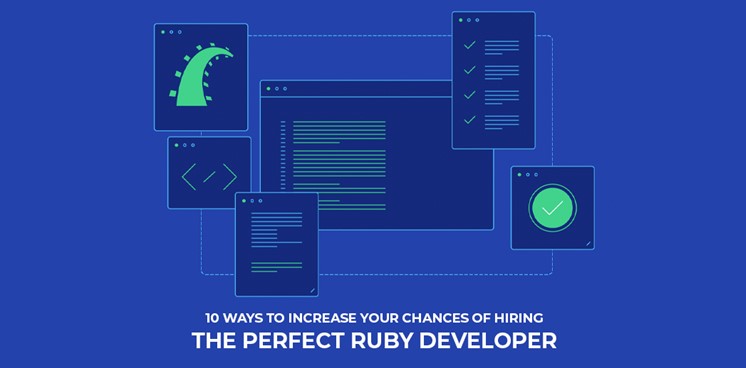10 Ways to Increase Your Chances of Hiring the Perfect Ruby Developer
If you’re looking to hire Ruby on Rails developers, the first step in the process is to know what you’re looking for and where to find it. While there are thousands of qualified professionals who can build your Rails app, some job seekers have more experience than others and can bring more expertise to the table. So how do you get started? Here are 10 ways to increase your chances of hiring the perfect Ruby developer for your next project.
Table of Contents
1) Set a clear scope for your project
Failing to set a clear scope is one of the biggest reasons projects fail. If you’re building something new and are hiring a developer or agency, make sure you clearly define exactly what you need done. The clearer your requirements are, in terms of both timeline and deliverables, at least at first, then better your chances will be that you get what you want with little fuss.
2) Outline expectations about the technology stack
Outline expectations about their technology stack from day one, so there’s no confusion in your relationship with a developer you hire. What languages are used in your application? What kind of database should they use? Are there any frameworks or libraries you expect them to be familiar with? If a developer isn’t up-to-date on all things tech, they might make a poor impression during an interview—and could also hinder your business as you try to launch new products or features.
3) Pick an experienced developer
While it’s tempting to hire a new developer who’s never worked for your company before, doing so will increase your chances of hiring someone who isn’t right for you. Finding a developer with at least two years of experience working on their own or at another company is important. An experienced developer will know what they need from a job and can be more easily convinced that your team would be an excellent place for them.
4) Conduct an in-person meeting first
Like any major investment, meeting a potential developer in person is a crucial first step. Meeting someone face-to-face makes it easier to judge their character and professionalism, as well as get a feel for how easy they’ll be to work with. Plus, by hiring someone you’ve met personally, you can better communicate what you want from them, and make sure you both have similar goals for your project.
5) Consider remote workers
In today’s world, working with a remote team can increase your company’s productivity. But is it right for you? When hiring, try considering candidates who work remotely so you have more applicants to choose from. This will also make it easier to hire top talent, since they may be drawn to your company because they know they won’t have to relocate.
6) Screen multiple candidates before hiring anyone
During your hiring process, you’ll likely come across several talented developers. Don’t be afraid to screen each candidate before making an offer. You’re interviewing them for a reason—to learn whether they possess all of your desired traits, not just whether they can code well. Take advantage of every interview opportunity you have and don’t feel pressured into hiring anyone until you find someone who is perfect for your company. Once you do find that person, don’t let them slip away!
7) Look at previous work samples
A developer’s portfolio is one of your first places to look for red flags. Make sure that code samples are up-to-date, not just from a few years ago, and have relevance to today’s applications. For example, if you’re hiring someone who will be working on ecommerce websites, he should have some examples in his portfolio that demonstrate skills in that area.
8) Check references
Developers are often hired based on their track record and background—which is great when they have one. But sometimes, they don’t. When you don’t have a history with a developer, check references anyway; even if a developer tells you he has never worked in your industry or used your technologies before, it doesn’t mean he won’t be able to get up to speed quickly.
9) Place more emphasis on soft skills than technical skills
While it’s important to focus on each candidate’s specific experience, technical skills are often less important than soft skills—in particular, communication and social skills. To get a good sense of how a potential hire will fit in with your team, ask them about their hobbies and interests and have them tell you about a past experience that required collaboration or creative thinking. If they seem like a good match for your team culture, consider offering them an interview.
10) Ask potential employees open-ended questions
Asking potential hires open-ended questions—those that require more than a yes or no answer—gets them talking and demonstrates your interest in them as a person. Plus, it gives you insight into their personality before you make an offer. This allows you to find out whether they’ll be a good fit for your company right away instead of later on down the road when things don’t work out.


